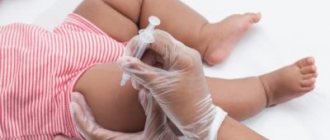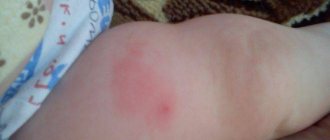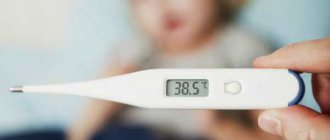DPT is a vaccination that protects a child from infection with tetanus, whooping cough and diphtheria bacilli. It is produced by the Russian company Microgen. The vaccine produces lasting immunity in 85% of cases.
In order for the post-vaccination period to go well, you need to understand what is allowed and what is prohibited to do after the injection. Many parents have a question about whether it is possible to wet DTP. To give an answer, you need to understand what a vaccination is and what happens in the body after the antigenic material enters.
Is it possible to bathe a child after DTP vaccination?
DTP contains toxoids of tetanus and diphtheria pathogens, inactivated microbial cells of whooping cough.
After the drug penetrates the body, the immune system is activated and begins to fight foreign substances. This process produces antibodies that remain for a long time and prevent infection and the development of the disease.
Over the course of several post-vaccination days, a slight deterioration in health may be observed: the temperature rises, weakness appears, and appetite decreases. Local reactions in the form of redness, pain and swelling of the puncture area are acceptable.
Many doctors advise not to bathe your baby for a while after vaccination. They explain their position by the fact that the baby’s immunity is weakened after vaccination; certain factors can worsen the course of the period after the prevention of tetanus, diphtheria and whooping cough.
Opponents of water procedures after DPT prohibit taking a shower, bathing, visiting the pool, swimming in the sea and river. According to doctors, knowing and adhering to such restrictions, parents protect their child from many diseases and complications.
Other pediatricians, on the contrary, advocate bathing after vaccination; they explain their point of view as follows:

- for some time after immunoprophylaxis, the child feels unwell, may be capricious and suffer from insomnia;
- water has a calming effect on the nervous system and relaxes muscles. This helps relieve tension and improves sleep.
Several studies have been conducted in which medical scientists have found that it is possible to wash a baby after DPT; this does not lead to any negative consequences.
Most doctors advise bathing a child wisely, taking into account his condition and the conditions in the apartment.
Pediatrician Komarovsky recommends following these rules when carrying out water procedures for a recently vaccinated baby:
- delay taking a bath or shower if the baby's body temperature is elevated;
- if the apartment is cold or too hot, or there are drafts, then it is better not to bathe the baby;
- for hygiene procedures use warm boiled water;
- Do not use sea salt or aromatic oils. Take only special hypoallergenic baby soap for hygiene;
- After bathing, wipe the child dry and wrap him in a blanket.
The process of forming protective forces lasts about a month. During this period, the baby’s body weakens and becomes susceptible to various infectious and viral pathologies.
When is swimming allowed?
If the baby eats with appetite, plays and there is no body reaction to the vaccine, he can be bathed on the first day after immunization.
The main thing is to follow a number of rules:

- Use boiled water. Do not add herbal infusions.
- Maintain the water temperature within 36-39 degrees Celsius.
- Children are only allowed to swim for a short time. 5-10 minutes is enough.
- The grafting site may only be moistened with water, but not rubbed with a sponge.
- After leaving the bath, you should immediately dry the child with a towel and dress him, avoiding hypothermia.
- You need to make sure that there are no drafts in the room.
By complying with these requirements, negative consequences after DPT will not arise. Bathing is allowed immediately after the vaccine is administered if there are no changes in the baby’s well-being.
Considering that the reaction to the vaccine often appears on the second day, it is still recommended to postpone bathing.
Why you shouldn’t get the injection site wet: possible consequences of bathing
Almost all parents know that they should not wet the puncture after the Mantoux test, as there is a risk of distorting the test result. But not everyone understands why doctors prohibit swimming after DTP. Restrictions on water procedures during the post-vaccination period are explained by the fact that taking a shower or bath can provoke undesirable consequences.
Swimming immediately after vaccination can cause:
- injection site infection . Tap water is of poor quality. For the first couple of days, there is a wound in the puncture area, into which pathogenic microorganisms can easily penetrate. When a puncture comes into contact with water, the risk of inflammation, swelling, and suppuration increases. If an abscess forms, it will have to be removed surgically;
- cold . After vaccination, the immune system is weakened. The slightest draft and temperature difference can cause a cold. In this case, the pathology will be difficult;
- stress. Vaccination is a burden on the body. If a child does not like to swim, then water procedures will be additional stress for him;
- improper formation of specific immunity . Antibodies may be produced in insufficient quantities or not formed at all. This is explained by the fact that in the post-vaccination period the body is weakened, since all its forces are aimed at fighting antigenic material. If a child gets sick, the immune system will begin to fight the pathology and will react less to DTP.
It is better to refrain from swimming for a couple of days. During this period, it is allowed to wipe the child’s body with a damp towel or napkins without touching the puncture area.
Reasons for banning swimming
Bathing poses the risk that an infection or virus may enter the injection site, which can affect your health. However, doctors prohibit water procedures for another reason. Changes such as redness, fever and irritation may occur as a result of taking a bath.
In addition, the immune system is weakened after the vaccine has been administered. Antibodies are actively produced in the body. While swimming, there is a risk of hypothermia, which can lead to a cold and the onset of an inflammatory process.
After immunization, the following body reactions are often observed:

- hyperthermia (thermometer readings exceed 39 degrees Celsius), reducing the temperature with antipyretic drugs turns out to be problematic;
- chills;
- runny nose;
- headache;
- drowsiness;
- irritability;
- tearfulness;
- weakness;
- apathy;
- gagging;
- diarrhea;
- cough;
- convulsions;
- sore throat.
Temperature changes during bathing provoke the manifestation of these symptoms. Contact with water may cause an inflammatory process. The body's response to the vaccine intensifies. The situation is getting worse.
How many days later can a child be washed after DTP?
Doctors have different opinions regarding how long it is worth abstaining from water procedures after vaccination. Most doctors recommend not washing your baby for 1-3 days.
The period of restrictions depends on various factors:

- baby's condition;
- conditions in the apartment;
- local reaction in the injection area.
If the child feels well and has a normal body temperature, then he is allowed a bath and shower the very next day. In this case, it is better to try not to wet the puncture site. Each baby’s body reacts differently to the introduced antigenic material.
Some may experience the following symptoms for more than three days:
- hyperthermia;
- cough;
- general malaise;
- runny nose;
- thickening and redness in the injection area.
In such cases, you should not bathe the child until he has fully recovered.
After three days, the wound formed after the injection will heal and infection from tap water will no longer be able to get into it. Then it is allowed to carry out full hygiene procedures.
How long should the vaccine not be wetted?
The document compiled by specialists from the Russian Ministry of Health states that contact with water should be avoided for 3 days. This means that you can wash in the shower so that water does not get on the injection site.
For protection, doctors recommend covering the injection site with a gauze pad and a small piece of film, and fixing them with a bandage on the upper part of the arm before starting hygiene procedures. If water gets on the graft, there is no need to panic. It is enough to immediately blot the body with a clean towel (do not rub).
There is no need to be afraid of undesirable consequences either. Foreign doctors, on the contrary, advise those vaccinated against coronavirus to apply wet, cold wipes to the injection site to reduce pain and itching.
What else should you not do on the first or second day after vaccination?
Bathing is not the only restriction during the period after the introduction of DTP. There are a number of prohibitions that parents should be aware of and adhere to. This will help prevent post-vaccination complications. Doctors are obliged to inform you before the manipulation about what can and cannot be done after immunoprophylaxis.
During the first two days after vaccination it is prohibited:
- overfeed the baby. This creates additional stress on the body;
- introduce new dishes into the diet. If the child is breastfed, then the mother should exclude from her menu all exotic fruits, vegetables, chocolate, citrus fruits and other products that can trigger the development of allergies. If the baby is on complementary foods, it is recommended not to make any changes to the baby’s established diet for some time;
- Let the child comb the injection site. This can lead to enlargement and infection of the wound after DPT;
- visit public places with your child. Locking your son or daughter within the four walls of the house is also harmful to health. Experts recommend walks in the garden, forest belt (where there are few people, low probability of infection with infectious and viral pathologies);
- treat the thigh or shoulder where the DTP injection was given with various ointments, creams, lotions. This can lead to the development of allergies and improper formation of specific immunity. If a lump appears in the injection area, the skin begins to redden and swell, then it is better not to self-medicate, but to consult a pediatrician;
- dress the baby in synthetic and tight clothing. In this case, the likelihood of developing a local reaction in the form of redness and swelling of the injection area increases. Clothes should be made from natural fabrics and loose;
- ignore the symptoms of DPT side effects and try to eliminate them yourself. This threatens the development of severe post-vaccination complications. Therefore, if pathological signs appear, you should consult a doctor.
Is it possible to swim and walk outside after vaccinations against hepatitis and pneumococcus?

In addition to DTP, children are also vaccinated with other drugs. For example, babies are protected from infection with pneumococcal infection and hepatitis virus. Parents are wondering whether it is allowed to walk outside and swim after such vaccines.
The effect of all vaccinations on the body is similar, so these restrictions apply not only to DTP, but also to all other drugs for immunoprophylaxis.











